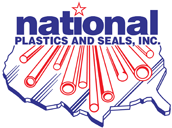Plastic Sheet, Rod & Tube
ABS: Tough, impact resistant ABS (acrylonitrile-butadiene-styrene) works well for protective applications such as small appliance housings. |
||
Includes: |
• ABS/PVC |
• ABS / Thermoplastic |
Acetal: These rigid materials have a slippery surface and withstand wear well. Common applications include valve components, gears, and bearings. Sample sheets are available. |
||
Includes: |
• Delrin |
• Acetal Copolymer |
• Turcite |
• Acetal Homopolymer |
|
Acrylic: Use this material for sign and window applications. Has a smooth surface and can be used indoors or outdoors unless noted. |
||
Includes: |
• Extruded acrylic |
• Cast acrylic |
• Acrylic/PVC (Kydex T) |
||
Carbon Fiber: A laminated composite of woven-glass fabric, carbon graphite fibers, and epoxy. Common applications for this material include use in structural applications.
Fiberglass: These materials have good tensile strength and good impact strength. Standard fiberglass is used for a wide variety of lightweight structural applications like handrails and platforms. Electrical grade fiberglass is excellent for electrical enclosures, electrical switch gears, transformers, and barriers.
Fluoropolymers: These materials are tough yet easy to machine. Fluoropolymers generally offer good weather resistance. Uses include wear strips, wire coatings, valves, and liners. |
||
Includes: |
• Teflon® PTFE |
• PTFE (polytetrafluoroethylene) |
• ETFE (ethylene tetrafluoroethylene) |
• PFA (perfluoroalkoxy fluorocarbon) |
|
• CTFE (chlorotrifluoroethylene) |
• PVDF (Kynar) |
|
• ECTFE (Halar) |
• FEP (fluorinated ethylene-propylene) |
|
• Rulon® |
||
Nylon: For use in general purpose wear applications. This material has good tensile strength unless noted. |
||
Includes: |
• Nylon 6/6 |
• Cast Nylon 6 |
• Nylon 6/12 |
• Kevlar/Nylon (Hydlar Z) |
|
PEEK: Comparable to Vitrex, PEEK (polyetheretherketone) maintains its shape and offers greater tensile strength in a wider temperature range than PTFE. |
||
Includes: |
• Carbon-Filled PEEK |
• Glass-Filled PEEK |
Polyamide-imide: Also known as Torlon, this material maintains its tensile strength, shape, and stiffness better than PEEK. It also handles a wider temperature range than Ultem. Can be used indoors and outdoors. It is commonly used in severe wear applications.
Polycarbonate: Has excellent clarity and impact strength over a wide temperature range. Can be used indoors and outdoors. |
||
Includes: |
• Abrasion-Resistant Polycarbonate |
• Static Dissipative Polycarbonate |
• Bullet-Resistant Polycarbonate |
• Glass-Filled Polycarbonate |
|
Polyester: This material offers dimensional stability and good resistance to wear and chemicals. |
||
Includes: |
• PET (polyester) |
• PETG |
• PET film (Mylar) |
• Hydex |
|
Polyetherimide: Made from Ultem 1000 resin, this material offers high strength and excellent electrical insulating properties over a wide range of temperatures. Use it for high-voltage circuit-breaker housings as well as for jet and automobile engine components.
Polyethylene: This group of plastics, a member of the polyolefin family, encompasses a wide variety of grades with a wide range of properties. Low-density polyethylene is commonly used in shrink wrap applications. High-density is often used in pipe, shipping pallets and truck bed liners. |
||
Includes: |
• LDPE (low density polyethylene) |
• UHMW (ultra high molecular weight) |
• HDPE (high density polyethylene) |
• VHMW (very high molecular weight) |
|
Polyimide: This material offers a wide range of properties as well as temperatures. Common applications include gasketing for electronics, thermal fixtures, valve seats and wear pads. |
||
Includes: |
• Kapton® |
• Vespel® |
Polyphenylene Oxide: Made from Noryl® resin, this material offers excellent electrical insulating properties with good impact strength and low moisture absorption in a wide range of temperatures.
Polypropylene: A member of the polyolefin family, this material is one of the most commonly used low-cost non-toxic plastics. It has a hard, smooth surface that prevents bacteria build-up and is chemically resistant. Commonly used for pipes, valves, and fittings. |
||
Includes: |
• Flame-Retardant Polypropylene |
• Rubber-Backed Polypropylene |
Polystyrene: Easy to machine, low-cost plastic with good stiffness-strength balance. Most commonly used in dairy containers, lids, and refrigerator interiors.
Polysulfone: With its excellent resistance to chemicals, hot water, and steam, this material is a great choice for pharmaceutical, medical, and food-service applications. It’s also good for electronic equipment industries.
PPS: Easier to machine and absorbs less moisture than Ultem. Bridges the gap between Ultem and PEEK and is good for electronic equipment, chemical production, and automotive applications. Also known as Techtron, Fortron, and Ryton.
PVC: With its good chemical and corrosion resistance, PVC (polyvinyl chloride) is the most widely used vinyl. It's often used for corrosion-resistant tanks, ducts, and fittings. |
||
Includes: |
• Type I |
• Type II |
• CPVC |
• Expanded Rigid PVC |
|
Radel: Withstands prolonged exposure to chemicals better than polysulfone and maintains its strength and creep resistance. Ideal for medical applications such as sterilization trays and surgical instrument handles.
Surface Finish
Smooth | Smooth on One Side, Adhesive-Ready on Other Side | Textured on Both Sides | Textured on One Side | Pebble Finish on Both Sides | Pebble Finish on One Side | Rough
Color
Opaque materials block the passage of light. Translucent materials allow the passage of light, but not necessarily a clear view of what lies beyond. Clear materials allow view of what lies beyond without obstruction or haziness.
Tolerance
Standard: Material is manufactured to a nominal dimension according to commonly accepted tolerances. Example: 1/4″ Diameter ±.002″.
Ground: Material is ground to closer tolerances to the nominal dimension than standard. Example: 1/4″ Diameter ±.001″.
Specifications Met
3A Sanitary Standards (3A) Compliant | Aerospace Material Specifications (AMS) | American Society for Testing and Materials (ASTM) | Food and Drug Administration (FDA) Compliant | Military Specifications (MIL) | National Sanitation Foundation (NSF) Compliant | Underwriters Laboratories (UL) | U.S. Department of Agriculture (USDA) Compliant | United States Pharmaceutical (USP) |

